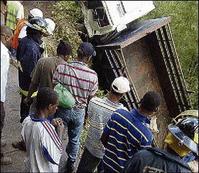
Insurance Helpline With cedric Stephens
The following is the second response to issues relating to the insurance of market trucks.
Question: At least two accidents have taken place on the roads recently, in which many persons were hurt or fatally injured. Fourteen persons died when a truck went off the road in Portland before Christmas. Other passengers also suffered injuries.
Three persons were also killed in a collision in St Elizabeth at the start of this year. Two other occupants of the car are in hospital. Will the injured or the dependents of those who died get any money from the insurance on the vehicles?
- BS, Mandeville.
Answer: The feedback I received from two readers - with links to local motor insurers - drove me to write a second answer to your question. Issues relating to the insurance of market trucks are more complicated than I suggested.
The bottom line: My first response should have dealt with each accident separately instead of jointly.
Checks with other sources indicated that the feedback was accurate. The victims and dependents of those who were injured or killed in the Portland accident are unlikely to get any compensation under the Motor Vehicles Insurance (Third-Party Risks) Act.
STATE HAS IMPORTANT ROLE TO PLAY
One reader, an attorney-at-law, wrote: "In the recent Portland accident where 14 people died, even if the driver had been properly licensed, and the insurance had been in place, it is highly unlikely that injuries to the passengers in the back of the truck would have been covered.
"When the 'Passenger Liability' section at the end of the Motor Vehicles Insurance (Third Party Risks) Act was being added, many years ago, the general-insurance industry lobbied strongly against it.
The police and legislature had a duty to ensure that the practice of having large numbers of improperly seated passenger in the backs of market trucks was regulated and controlled.
If this responsibility was to be placed on general insurers by forcing them to indemnify such passengers, then the rates for motor insurance on commercial vehicles of this type would, inevitably, have to be increased massively.
"Arising from these representations, the 'Passenger Liability' section was NOT brought into force, although included in the act - and still has not been brought into operation.
"Accordingly, where commercial motor-vehicle policies are extended to include liability to passengers, it is the market practice to limit such indemnity to the number of passengers which the vehicle is licensed to carry and who are seated in the cab.
"This is a matter needing urgent attention, along with, as you have pointed out, the now seriously outdated indemnity limits in the act."
Users of MARKET TRUCKS
Have the organs of state discharged their duty to protect persons who use market trucks, given the aims of the Motor Vehicles Insurance (Third-Party Risks) Act? The other writer answers a loud NO.
"We should long ago have relegated to the past the sight of dozens of persons sharing the backs of market trucks with goods and livestock. Apart from the danger involved, it is just too reminiscent of the Middle Passage for my liking," he said.
"As a nation, we need to be more protective of our most valuable resource."
Said another source: "Market trucks are licensed by law to carry goods and some passengers. A load limit for goods is usually specified. A passenger limit based, among other things, on the size of the cab, also applies. Vehicle owners are not permitted to exceed the load limit for goods or passengers. The carriage of passengers outside of the cab is, strictly, against the law."
Passengers carried in the rear of these vehicles - fare-paying and non-fare-paying - are not eligible for compensation in the event of injury. Virtually all motor policies for market trucks are written this way.
personal injuries
Additionally, even persons who travel in the cabs of market trucks (or their dependents) are likely to be short-changed in the event of injury or death.
This is based on trends in court awards for personal injuries and the present limits in the act.
Our compulsory-compensation scheme for the victims of motor-vehicle accidents has a long history. The tragedy in Portland highlights the fact that Parliament should take urgent steps to bring the laws and regulations into the 21st century.
This would create the climate for motor insurers to do the job they were set up to do. The discrimination against persons who have no choice but to use the services of market trucks to earn their livelihood should be ended.
Making restitution in the case of personal injury or property damage has biblical origin - Exodus chapters 21 and 22. According to the New Living Translation, the case studies used in these chapters have two objectives: to protect and organise the nation. I could not have said it any better. Transport Minister Mike Henry: the ball is now in your court!
Cedric E. Stephens provides independent information and free advice about the management of risks and insurance. Email: aegis@cwjamaica.com.

People watch as a crane recovers the truck which overturned in Fellowship, Portland, killing 14 persons in December. - File